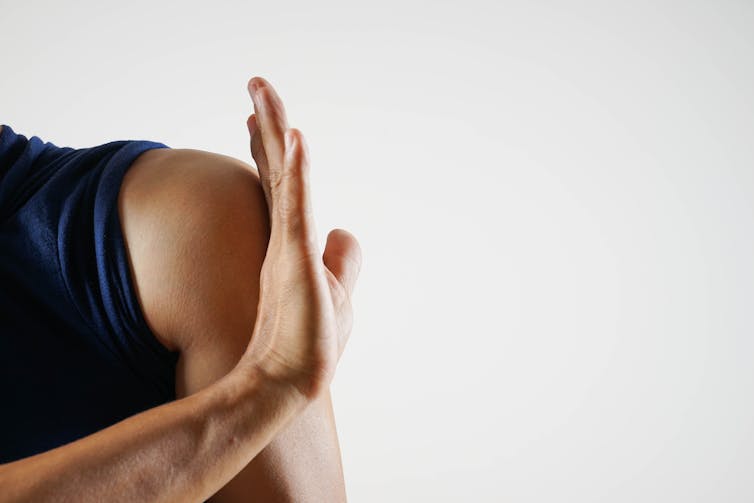Media reports about vaccine hesitancy could contribute to the problem
- Written by Heather Green, Senior Lecturer, School of Applied Psychology, Griffith University

Alongside logistical and supply issues, vaccine hesitancy has been a notable hurdle in Australia’s troubled vaccine rollout.
The news the Australian Technical Advisory Group on Immunisation (ATAGI) now recommends Pfizer over AstraZeneca for everyone under 60[1], owing to a rare blood clotting disorder, is proving another blow[2] to vaccine confidence.
With active local COVID cases[3] in Victoria and New South Wales, it’s timely to be considering all possible factors which may be contributing to vaccine hesitancy.
One is the media. While news reports of vaccine hesitancy may well be describing genuine community concerns, they could be inadvertently fuelling COVID vaccine fears.
Why are some Australians reluctant to get a COVID vaccine?
While Australians perceive their environment is safe and relatively free from COVID-19, some will remain unmotivated to have the jab. They may hesitate to be immunised as they believe the vaccine could pose a greater risk than the virus itself.
This is not the case. ATAGI’s evolving recommendations[4] ensure the benefit of getting vaccinated against COVID outweighs the risk for every age group.
Fear, meanwhile, is a behavioural motivator. The latest outbreak in Melbourne saw record numbers[5] of Victorians turn up for vaccination.
Read more: From smallpox to polio, vaccine rollouts have always had doubters. But they work in the end[6]
A Griffith University survey[7] conducted in the middle of 2020 found 68% of people would take a COVID-19 vaccine if one was available. Those who said they wouldn’t had concerns regarding side effects, quality of testing, and speed of vaccine development.
So we can see even when community transmission in Australia was higher, and before we knew about rare adverse events like the blood clots, safety was a key concern.
 Vaccine hesitancy can stem from concerns about the safety of the vaccine. Shutterstock[8]
Vaccine hesitancy can stem from concerns about the safety of the vaccine. Shutterstock[8]
Reporting on vaccine hesitancy could worsen the problem
For the past several months, it seems as though every other day there’s been a new report or survey in the news[9], revealing x proportion of people are hesitant about getting a COVID vaccine.
Our attitudes and behaviours are shaped by what others in society do — social norms[10]. A recent study found university students in the United States who perceived their peers felt COVID-19 vaccination was important were more likely[11] to report they intended to get a vaccine themselves.
Similarly, it’s important to acknowledge there’s a real danger[12] hesitancy and delay in vaccination, when reported widely in the media, could catch on to more people.
Read more: Diverse spokespeople and humour: how the government's next ad campaign could boost COVID vaccine uptake[13]
A review[14] of 34 studies found the way parents interpreted media reports about vaccination depended on their pre-existing beliefs. For example, a report of a “rare” side effect might reassure parents who already believed vaccine benefits outweigh risks, whereas the same report could discourage parents who were already concerned about side effects.
Indeed, humans are prone to confirmation bias[15] — paying more attention to information that fits with prior beliefs. Seeking and considering evidence which goes against our beliefs[16] is hard for our brains.
But the media can help with this in the way they frame their reports. For example, emphasising that the majority of Australians want to and intend to vaccinate is a better option than focusing on the number who don’t.
For people already hesitating, another report could further shift the balance away from vaccination. So reporters should think carefully about the way they present vaccine hesitancy stories (and the need to present them in the first instance).
Reporting on vaccine safety also must be handled carefully
In Italy, media reporting about a small number of deaths following a batch of influenza vaccines in the winter of 2014/2015 was linked to a 10% reduction[17] in influenza vaccination among people 65 and older compared to the previous season.
These deaths were quickly confirmed as unrelated to vaccination[18], but it seems the early reports had a significant effect on behaviour.
In a global study[19], three of 13 national and state level immunisation managers interviewed said “negative information conveyed in the mass media” contributed to vaccine hesitancy in their countries.
On the flip side, media reports about influenza and vaccination can also increase vaccination uptake. In this study[20], careful data analysis showed higher numbers of news reports with “influenza” or “flu” in the headline corresponded with higher flu vaccination uptake in the same year.
 Media coverage about vaccines can both help and hinder vaccine confidence. Shutterstock
Media coverage about vaccines can both help and hinder vaccine confidence. Shutterstock
What should the media aim for in reporting on COVID vaccination?
Any reporting on Australians’ inclination to vaccinate should reinforce what is in fact the social norm — the intention of the majority to receive a COVID vaccine.
Further, media reporting on COVID vaccines should be careful to contextualise the benefits alongside the risks, and regularly remind consumers of reliable sources such as federal and state health departments and ATAGI.
Read more: Alarmist reporting on COVID-19 will only heighten people's anxieties and drive vaccine hesitancy[21]
And while the media must be cognisant of its role, the government needs to act quickly to reverse the hesitancy trend. People are looking for reasons to have the jab; they are desperate for a national roadmap out of COVID-19.
If Australians could see how becoming vaccinated would contribute to economic prosperity (for example, reopening tourism and international education[22]), and facilitate other things returning to normal, such as our ability to travel overseas, they would be motivated into action.
References
- ^ everyone under 60 (www.afr.com)
- ^ another blow (www.theguardian.com)
- ^ local COVID cases (www.health.gov.au)
- ^ evolving recommendations (www.health.gov.au)
- ^ record numbers (www.9news.com.au)
- ^ From smallpox to polio, vaccine rollouts have always had doubters. But they work in the end (theconversation.com)
- ^ survey (www.griffith.edu.au)
- ^ Shutterstock (www.shutterstock.com)
- ^ in the news (www.smh.com.au)
- ^ social norms (www.simplypsychology.org)
- ^ were more likely (www.ncbi.nlm.nih.gov)
- ^ real danger (www.smh.com.au)
- ^ Diverse spokespeople and humour: how the government's next ad campaign could boost COVID vaccine uptake (theconversation.com)
- ^ review (journals.sagepub.com)
- ^ confirmation bias (www.psychologytoday.com)
- ^ goes against our beliefs (www.bbc.com)
- ^ a 10% reduction (www.ncbi.nlm.nih.gov)
- ^ unrelated to vaccination (www.ncbi.nlm.nih.gov)
- ^ global study (www.sciencedirect.com)
- ^ this study (www.sciencedirect.com)
- ^ Alarmist reporting on COVID-19 will only heighten people's anxieties and drive vaccine hesitancy (theconversation.com)
- ^ tourism and international education (www.rba.gov.au)

















